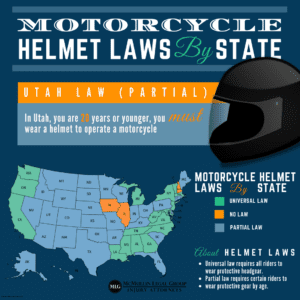Motorcycle Helmet Laws: State By State
This article discusses motorcycle helmet laws and how they differ from state to state.
Utah Law
In order to drive a motorcycle in Utah and if you are 20 years old or younger, you must wear protective headgear that complies with specifications under Utah law. If you are 20 years old or younger and violate motorcycle helmet laws, they are considered infractions.
State-by-State
There are 3 categories when it comes to Motorcycle Helmet laws in the U.S.
- Universal Law: all motorcycle operators must wear protective headgear. Some states also require all passengers to wear protective headgear as well. The affected states are: WA, OR, CA, NV, NE, MO, TN, AL, GA, MS, LA, NC, VA, WV, DC, MD, NJ, NY, VT, MA.
- Partial Law: Partial law is when the state can have its own rules and regulations related to motorcycle helmets. In Utah, anyone driving a motorcycle under 21 must wear protective headgear. In Florida, the same law applies, but the age is 20 instead of 21. Some states only apply their law of helmets while driving a motorcycle, and there is no law for passengers. In Colorado, the same law applies to those 17 and younger, AND 17 and younger passengers must wear protective gear as well. The affected states of partial law are: ID, UT, AZ, NM, AK, HI, TX, AR, OK, KS, SD, ND, MN, WI, MI, IN, OH, KY, SC, FL, PA, DE, CT, RI, ME.
- No Law: There are three states, Iowa, Illinois, and New Hampshire that do not have laws pertaining to motorcycle helmet use.
Motorcycle Passengers
In some states, there are no laws related to motorcycle drivers and wearing helmets; if they have a motorcycle driver’s license, they can drive a motorcycle and can choose to wear a helmet. Some states, however, require the passenger of a motorcycle to wear a helmet as well. The states that do require the motorcycle passenger of all ages to wear a helmet are:
CO, AK, ME (17 and younger), MI (20 and younger), ND, OH, RI, TX.
Common Problems, Crashes
There are several problems that occur when it comes to motorcycles helmet laws. The most common problems when it comes to the contribution of motorcyclists in motorcycle crashes are:
- Speeding
- Failing to keep in proper lane
- Following too closely
The most common problems when it comes to the contribution of other drivers in motorcycle crashes are:
- Failing to Yield
- Following too closely
- Improper turning
Utah Motorcycle Statistics
Motorcyclists account for around 3% of Utah drivers, but when it comes to fatalities on the road, 18% of fatalities are the result of a motorcycle crash. 60% of motorcyclists from 2012-2014 were wearing a helmet. From 2012 to 2014, there have been 3,848 motorcycles crashes, and only 108 people were killed in those crashes. It is dangerous when there is a crash with a car and a motorcycle,; however, 40% of the motorcycle crashes from 2012 to 2014 involved only the motorcycle and the motorcyclist(s).
Wrongful death by state
Wrongful death in Utah is defined as when someone is wrongfully killed in an accident, namely motorcycle accidents. When someone is killed wrongfully, the family or loved ones of the person killed has the right to sue the party who is responsible for the wrongful death, according to motorcycle helmet laws.



